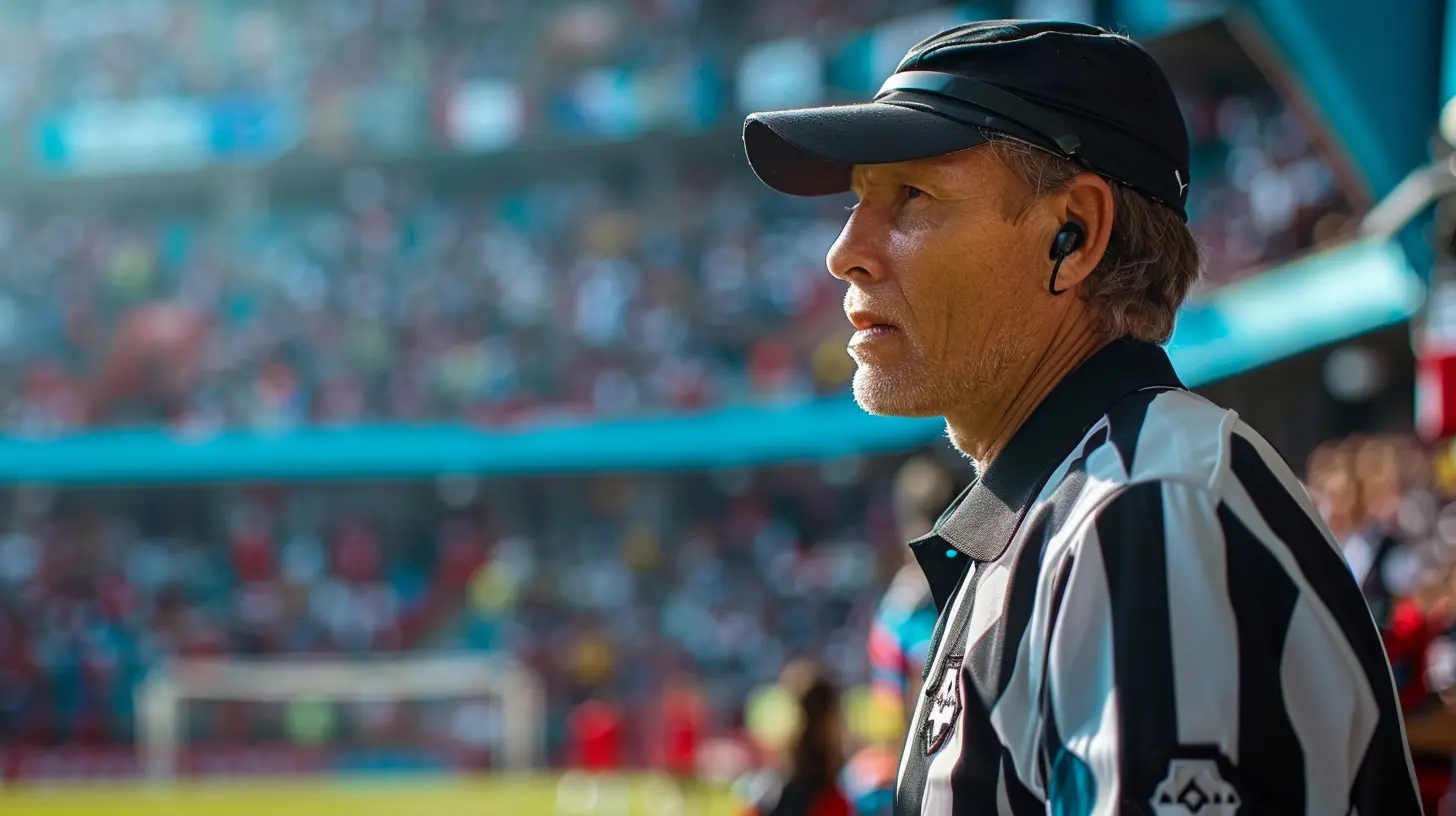Behind the Whistle: A Day in the Life of a Professional Referee
30 April 2025
When we talk about sports, we often focus on the athletes, their incredible skills, and the unforgettable moments they create on the field. But there's another group of individuals who are just as crucial to the game: referees. These unsung heroes are responsible for ensuring that the spirit of the game is upheld, rules are followed, and fairness prevails. But have you ever wondered what it's really like to walk in their shoes—or, rather, run in them?
In this article, we’ll dive deep into the daily life of a professional referee, exploring their challenges, routines, and the mental toughness required to handle the job. If you've ever yelled at your TV or from the stands, questioning a ref’s decision, this one's for you!

The Call of Duty: Starting the Day Early
Professional referees don’t just roll out of bed and head to the stadium to blow a whistle. Their day starts early, often before the sun rises. Whether it's football, basketball, or soccer, referees are athletes in their own right. Just like the players, they need to be in peak physical condition to keep up with the fast-paced nature of the game.Morning Routine: Fitness and Nutrition
For a professional referee, the day typically begins with a workout. But it’s not just about lifting weights or running on a treadmill. Referees need a balance of endurance, agility, and mental sharpness. Their training sessions often involve:- Cardio Workouts: To build stamina and ensure they can keep up with the athletes during a 90-minute soccer match or a four-quarter basketball game.
- Agility Drills: Quick decision-making is crucial, so agility training helps referees remain nimble and react swiftly to changing plays on the field.
- Mental Conditioning: Believe it or not, successful refereeing isn’t just about knowing the rules. It’s about staying calm under pressure and making split-second decisions in high-stakes situations. Mental conditioning exercises, such as meditation or visualization, help them stay focused.
After their workout, nutrition plays a key role. A balanced meal rich in proteins, healthy fats, and carbs ensures they have enough energy to sustain them through the day. Think of them like race cars—they need the right kind of fuel to perform at their best.
Pre-Game Preparation: More Than Just Studying the Rulebook
Referees don’t just show up to the stadium and start officiating; there’s a lot of homework involved. Pre-game preparation can include:- Reviewing Team Tactics: Referees will often study the teams they’re officiating. They look at previous games to identify patterns in play or potential areas where tensions might arise. This helps them anticipate tricky situations and manage the game more effectively.
- Refresher on Rules: While they already know the rulebook inside-out, it’s always helpful to review specific rules that might be more relevant to the upcoming game. Some leagues might even have specific guidelines or emphasize certain aspects of the game.
- Communication with Assistants: Teamwork is critical for referees. Before a game, head referees will meet with their assistant referees (or linesmen/line judges) to go over their responsibilities, game-specific concerns, and communication strategies for making calls.

Game Time: The Whistle Blows
The whistle signals the start of the game, but for referees, the hard work has already begun long before that. Now, they’re in the spotlight, and their decisions can affect the outcome of the game. Let’s walk through what happens during the game.Keeping Up with the Pace
If you think referees just stand around and blow the whistle every now and then, think again! Referees are constantly on the move. In a soccer match, for example, referees can run an average of 6-8 miles during a single game. They need to be positioned perfectly to see the action clearly and make accurate calls.In basketball, referees are constantly sprinting up and down the court, while in football, they’re dodging 300-pound linemen to get a good view of the play. It’s a high-energy job that requires both physical and mental stamina.
Making Tough Calls
If you’ve ever watched a game where the referee made a controversial call, you know how quickly things can get heated. Referees make hundreds of decisions during a game, most of which go unnoticed. But when a big call comes—like a game-changing penalty or a disallowed goal—they’re in the spotlight, and the pressure is immense.- Instant Decision-Making: One of the most challenging aspects of being a referee is the need to make decisions in real time. There’s no pause button. A referee might have a split second to decide whether a tackle was clean or if it warrants a red card.
- Dealing with Pressure: Referees face pressure not only from the players but also from the fans, coaches, and media. Every call is scrutinized. Keeping a level head when thousands of people are yelling at you isn't easy!
VAR and Technology: A Friend or Foe?
In recent years, we’ve seen the introduction of technology in sports officiating, such as Video Assistant Referee (VAR) in soccer or instant replay in basketball and football. While these tools are designed to help referees make more accurate calls, they’ve added a new layer of complexity to the job.Referees now have to balance their on-field calls with the possibility of a video review. This can sometimes slow down the game, and refs may face criticism for relying too much on technology. However, it’s also a valuable tool for ensuring fairness and accuracy in the game.

Halftime: A Moment to Breathe
Halftime isn’t just a break for the players; it’s a crucial time for referees too. During those 15 minutes, referees will:- Review Key Moments: They’ll quickly discuss any contentious decisions from the first half with their assistants. Did they get it right? Is there anything they need to adjust in the second half?
- Hydrate and Recharge: Just like the players, referees need to stay hydrated and focused. A quick snack or energy drink can help them power through the second half.
- Mental Reset: If the first half was particularly intense or controversial, halftime gives referees a chance to reset mentally. They need to stay sharp and focused for the remainder of the game, especially if it’s a close match.

Post-Game: Analyzing Performance
Once the final whistle blows, the game may be over for the players, but not for the referees. Their day continues with post-game analysis and feedback.Self-Reflection and Feedback
After the game, referees will typically meet as a team to debrief. They discuss any critical moments, review decisions, and, in some cases, watch video footage to evaluate their performance. Just like players, referees are always looking to improve.In many professional leagues, referees are evaluated by a supervisor or referee assessor. This feedback is crucial for their development and helps ensure consistency in officiating across the league.
Dealing with Criticism
Let’s face it—referees take a lot of heat. Whether it's from frustrated fans, angry players, or critical sports pundits, criticism is part of the job. Professional referees develop thick skin over time, but it doesn’t mean the criticism doesn’t sting.Some referees take the criticism constructively, using it to improve their decision-making in future games. Others may struggle with the mental and emotional toll that comes with the job. This is why mental health resources and support systems are becoming increasingly important for referees at all levels of sport.
Off the Field: A Life of Preparation and Passion
While officiating a match may be the most visible part of a referee’s job, there's a lot more that happens behind the scenes. Referees spend countless hours watching games, studying rule changes, and participating in training sessions. They also have to maintain peak physical fitness and stay up-to-date on new technologies in officiating.Most referees are incredibly passionate about the sport they officiate. After all, it's not a glamorous job, and the pay—while decent at the professional level—rarely matches the compensation of the athletes they oversee. Referees do it for the love of the game and the satisfaction of knowing they play a crucial role in keeping it fair and competitive.
Conclusion: The Unsung Heroes of the Game
Being a professional referee is not for the faint of heart. It’s a job that requires physical fitness, mental sharpness, and emotional resilience. Referees are often the first to be blamed when things go wrong and the last to be praised when things go right. But without them, the games we love wouldn’t be the same.So, the next time you find yourself frustrated with a referee’s decision, remember: they’re human too, doing their best to keep the game fair and enjoyable for everyone. Behind every whistle is a professional who has dedicated countless hours to mastering their craft, all in the name of the sport we all cherish.
all images in this post were generated using AI tools
Category:
RefereeingAuthor:

Umberto Flores
Discussion
rate this article
6 comments
Zaylee Powell
Secrets lurk behind every whistle—who's watching closely?
May 15, 2025 at 7:19 PM

Umberto Flores
Indeed, the world of officiating is full of hidden dynamics, where every decision is scrutinized and every moment counts.
Nellie Mercado
Referees are the backbone of sports, ensuring fair play and maintaining order in the heat of competition. This article brilliantly showcases the often-overlooked dedication and intense scrutiny they face daily. A must-read for anyone who truly appreciates the game!
May 12, 2025 at 2:37 AM

Umberto Flores
Thank you for your thoughtful comment! I'm glad you found the article insightful and appreciate the vital role referees play in sports.
Blake Vasquez
Thank you for shedding light on the often-overlooked challenges referees face. Your dedication and resilience play a crucial role in the spirit of the game.
May 9, 2025 at 6:30 PM

Umberto Flores
Thank you for your kind words! I'm glad to highlight the vital role referees play in the game.
Valentina Wheeler
This article offers a fascinating glimpse into the challenges and responsibilities of professional referees, highlighting their rigorous training, decision-making pressure, and the essential role they play in maintaining fair play.
May 7, 2025 at 12:42 PM

Umberto Flores
Thank you! I’m glad you found the article insightful. Professional referees truly play a crucial role in the game.
Ryder Henson
What a fascinating glimpse into the life of a referee! It's easy to overlook the dedication and challenges they face. Your insights bring a deeper appreciation for their role in sports. Thank you for shedding light on this vital yet underappreciated profession!
May 4, 2025 at 8:32 PM

Umberto Flores
Thank you for your thoughtful comment! I'm glad you found the insights valuable and appreciate the dedication of referees.
Ashira Wright
Great insight! Respect for the referee's role!
May 4, 2025 at 10:15 AM

Umberto Flores
Thank you! I'm glad you found it insightful. Referees truly play a crucial role in the game!




